“The Deadly Years”
Written by David P. Harmon
Directed by Joseph Pevney
Season 2, Episode 11
Production episode 60340
Original air date: December 8, 1967
Stardate: 3478.2
Captain’s log. A landing party beams down to Gamma Hydra IV, consisting of Kirk, Spock, McCoy, Scotty, Chekov, and Lieutenant Arlene Galway. Nobody meets them, even though they’re there for a standard annual checkup of a scientific outpost. It’s not like they weren’t expected—in fact, Kirk spoke to Robert Johnson, the expedition’s leader, an hour earlier, and while he seemed a bit disjointed, everything seemed fine.
Kirk sends folks to look around, and Chekov finds the desiccated corpse of a very old human male. McCoy verifies that he died of old age—which Spock says is impossible, as he checked the personnel records, and none of the colony personnel were over thirty.
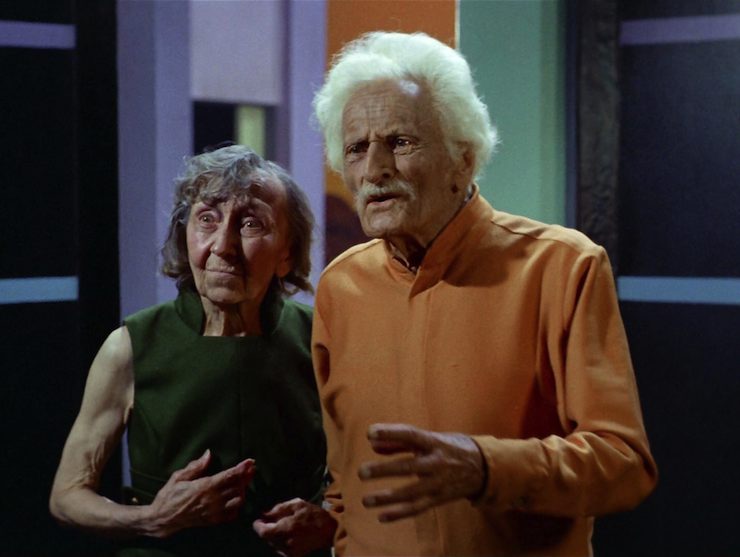
Then Johnson shows up with his wife, Elaine. They’re both quite elderly, and Johnson is half deaf, but they assure the landing party that they’re in their late twenties. There were six people assigned to the colony, and the Johnsons are the only ones left—the other four also died of old age.
Kirk calls a briefing, which includes two passengers on the Enterprise. One is Commodore Stocker, who is being transported to his new post commanding Starbase 10 by the Enterprise, the other is a civilian endocrinologist, Dr. Janet Wallace, whom Kirk asks to assist McCoy in trying to determine what’s happening from a medical POV. Spock is investigating whether or not this is a weapon, since Gamma Hydra IV is proximate to the Neutral Zone that separates the Federation from the Romulan Empire.
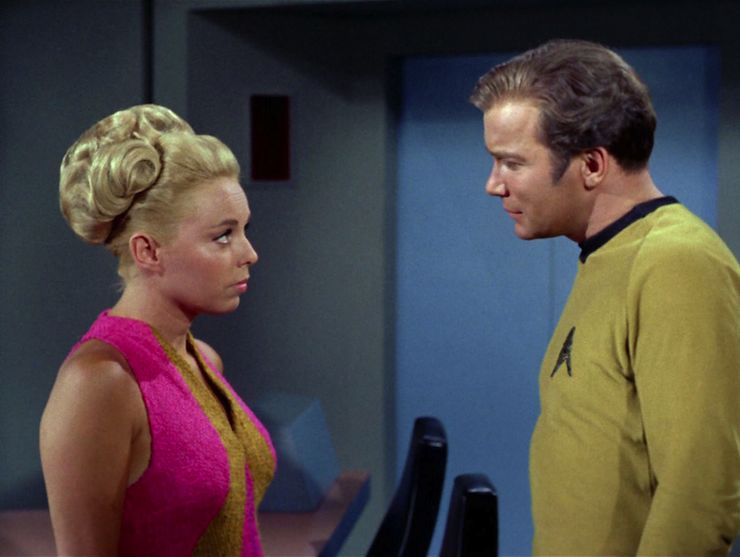
After the briefing breaks up, Kirk and Wallace have a chat. They have a past, but they couldn’t make it work due to their separate careers. Wallace did marry a man in her field, who died recently, but it’s obvious she still carries a torch for old Jimbo.
Spock reports to Kirk on the bridge that there is nothing in the atmosphere to account for the aging. However, there is a rogue comet that came through the system. This will probably be important later. Before leaving the bridge, Kirk repeats an order he already gave. Kirk is surprised, but tells Sulu to go ahead and follow it, and both Sulu and Spock are concerned by this out-of-character lapse. This also will probably be important later.
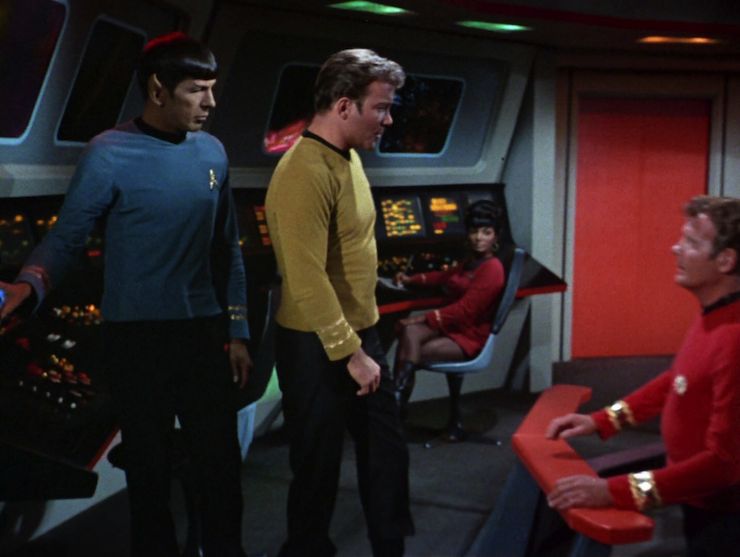
Galway reports to sickbay, looking rather poorly, and also suffering some hearing loss, which she’s never suffered before. After repeating another order to Spock, and feeling some shoulder pain, Kirk reports to sickbay also, just in time for Johnson to die of old age, and also notices that McCoy is getting gray.
McCoy examines Kirk’s shoulder and discovers that he has advanced arthritis, and it’s spreading. Scotty then arrives at sickbay wrinkled and gray.
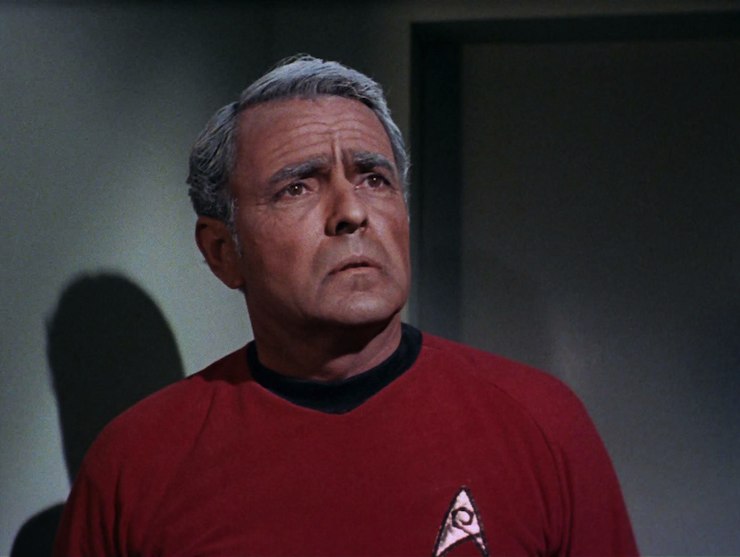
It quickly becomes apparent that everyone on the landing party—except, oddly, for Chekov—are aging rapidly. (Also the disease has apparently made McCoy and Kirk’s hair be combed differently.) Galway seems to be aging faster than the others, even though she’s in her early twenties.
Wallace and Kirk have an awkward conversation, as Wallace makes it clear she still loves him, but Kirk can’t help but wonder if it’s a sympathy-fuck because he’s dying of old age.
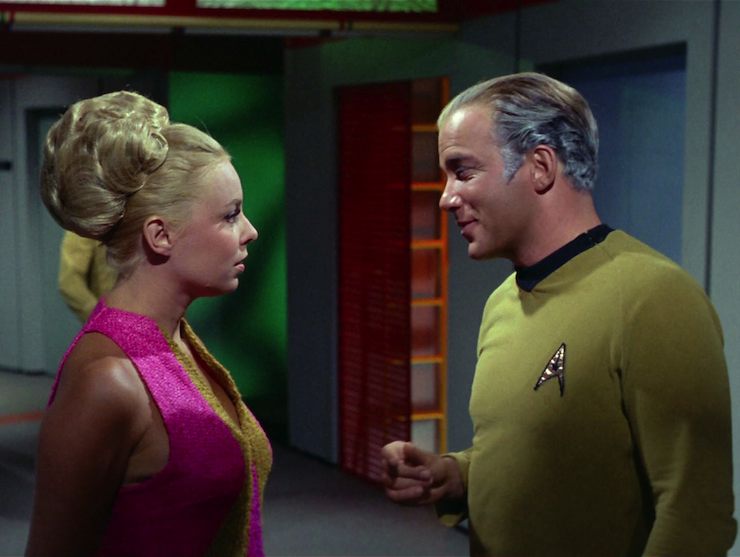
Kirk reports to the bridge, where it’s clear that his mental lapses are increasing. Stocker wants him to report to Starbase 10 so he can take command and also use the base’s greater resources, but Kirk refuses. He later falls asleep in the captain’s chair, only to be woken by a report from Spock. Turns out the comet left some very low-level radiation in the atmosphere, below the usual threshold for sensors. Kirk has Uhura report the comet to Starfleet Command (forgetting that Code 2 was broken by the Romulans along the way and only changing his order to Code 3 after Uhura gently reminds him), and he also forgets an order he gave Sulu.
Galway stumbles into sickbay and dies. Chekov meanwhile continues to not age, and nobody can figure out why.
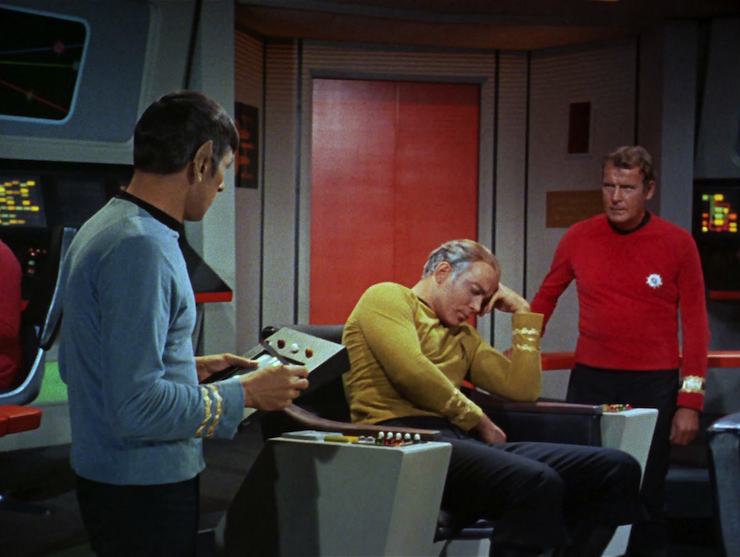
Stocker talks to Spock privately, concerned about Kirk’s failing mental capacity. Stocker wants Spock to relieve Kirk of command, but Spock himself says he is unfit—while Vulcans live longer, he’s still diminished. But if Spock, with his greater stamina and fitness, is diminished, Kirk is obviously more so. Stocker then points out that regulations require him to call a competency hearing on Kirk.
At the start of the hearing, Kirk declares it to be invalid, but Spock insists that regulations require it. Spock first questions Sulu, who testifies to Kirk repeating orders twice, then Yeoman Atkins, who testifies to Kirk asking to sign a fuel consumption report that he had already signed, then Uhura, who testifies to Kirk forgetting that the Romulans broke Code 2, even though Kirk received and initialed the memo that they’d broken it. McCoy did a complete physical on Kirk, which gives his biological age at between 60 and 72, even though he’s 34 years old. McCoy then (blearily) testifies to Kirk’s physical and mental deterioration that matches aging.
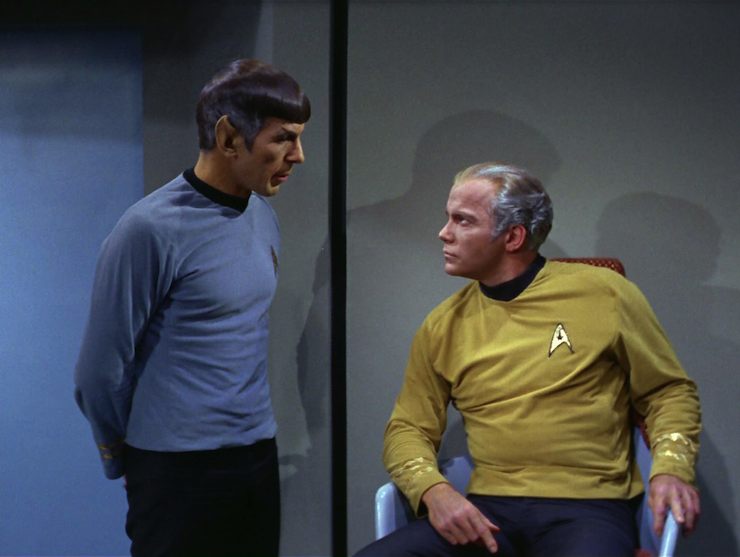
Kirk testifies to his own competence, which fails rather spectacularly by his referring to the planet as Gamma Hydra II, but he insists that this hearing is nothing more than mutiny. Even as he’s making more and more memory lapses, and Uhura and Sulu are wincing, Kirk says he can still command.
After Kirk is relieved, Stocker takes command, since the alternative is to leave a “junior officer” in command in a tense situation. (We’ll just ignore the fact that Sulu commanded the Enterprise during a war against the Klingons.) Stocker, a career bureaucrat, has never commanded a starship. Kirk accuses Spock of stabbing him in the back and kicks him out of his quarters. Wallace stays behind and lets Kirk rant and rave before being unable to stand it anymore.
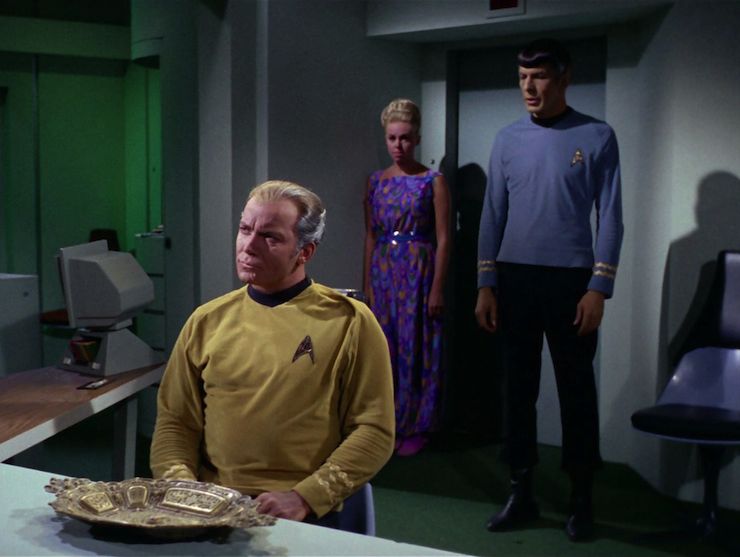
Kirk meets with Spock, McCoy, and Wallace in sickbay, trying to figure out how to cure the disease. They go over the events on Gamma Hydra IV. They recall that they separated for a bit—Chekov went off on his own, found the dead body, and was scared. McCoy hypothesizes that adrenaline could do the trick, that it was used to treat radiation after the atomic wars. The later discovery of hyronalin superseded it, but they might be able to synthesize something that will work. Spock, Wallace, and Chapel get to work on that.
Stocker has ordered the Enterprise to proceed on a direct course to Starbase 10—but that will take them through the Neutral Zone, in violation of treaty. Sulu questions that, but follows Stocker’s orders. Sure enough, as soon as the ship enters the Zone, Romulan ships show up and bracket them from all sides, firing on the ship. Stocker freezes, then tries to contact the Romulans, to no avail.
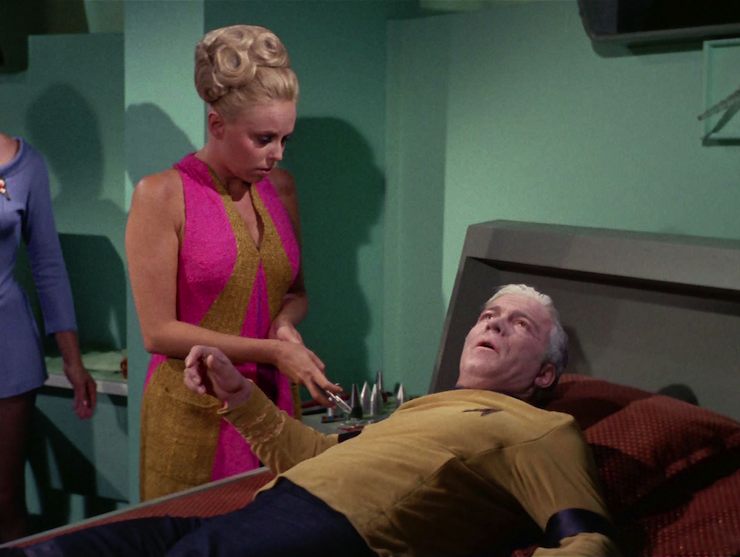
Kirk is frustrated by feeling his ship get pounded, and he insists on taking the first shot of the serum. He needs to get onto the bridge before Stocker gets them all killed. Wallace gives him the shot—and it works, though not without a lot of thrashing about.
A re-youngified Kirk runs to the bridge just as Stocker’s about to give up and surrender. Kirk orders Uhura to send a message in Code 2 to Starfleet Command: they’re surrounded by Romulans due to inadvertent entry of Neutral Zone, so they will have to trigger destruct sequence using newly installed corbomite device, which will destroy everything within 200,000 kilometers, and render that area a dead zone that should be avoided by all ships for four years.
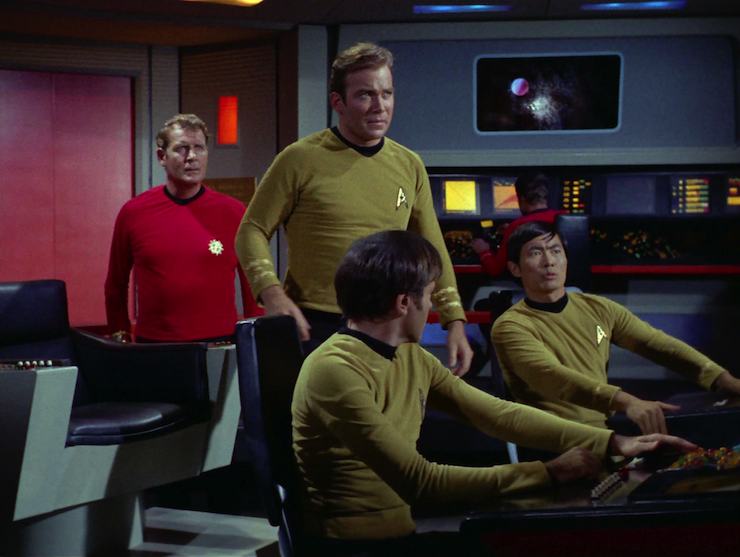
The Romulans back off quickly and Kirk zooms away at warp eight before the Romulans can figure out that they’ve been had. McCoy then reports to the bridge, also re-youngified, and reports that he’s fine, as is Scotty, though the latter pulled a muscle during the process. That just leaves Spock, and McCoy assures him that he removed all the breakables from sickbay.
Can’t we just reverse the polarity? Hyronalin is mentioned as the standard treatment for radiation sickness (which will be seen in future Trek productions), but prior to that it was adrenaline, which is the base for the cure of the radiation emitted by the comet.
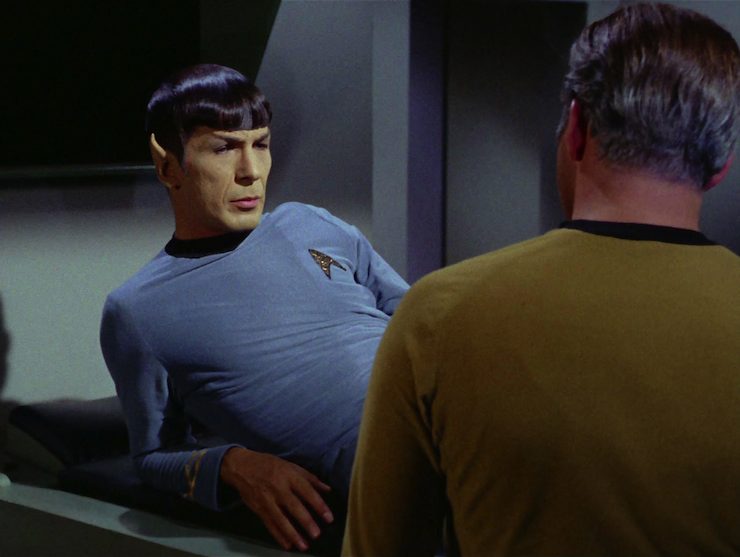
Fascinating. This episode establishes that Vulcans age more slowly than humans. This will later allow both Mark Lenard and Leonard Nimoy to appear on TNG without much by way of old age makeup…
I’m a doctor not an escalator. Apparently McCoy’s Southern accent gets stronger with age, just as it did with semi-drunken goofiness in “This Side of Paradise.”
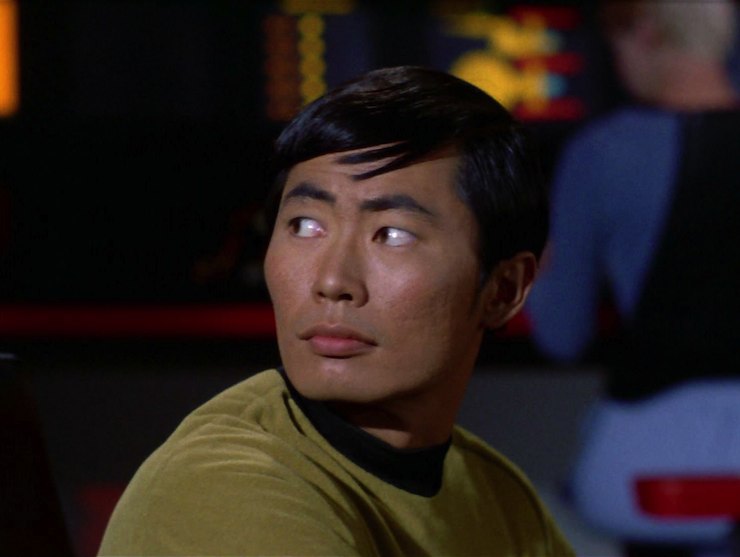
Ahead warp one, aye. Sulu was good enough to be left in command in combat against the Gorn and against the Klingons in “Arena” and “Errand of Mercy,” respectively, in the latter case during a declared state of war, so it’s unclear why Stocker can’t just put him in charge after Kirk’s declared incompetent. It’s even less clear as the battle against the Romulans rages on and Stocker keeps asking Sulu for advice.
Hailing frequencies open. Uhura gets the best line of the episode when Stocker asks her to let him know if they contact any Romulan ships. The ship is hit with weapons fire a second later, and Uhura dryly says, “I think we just made contact, sir.”
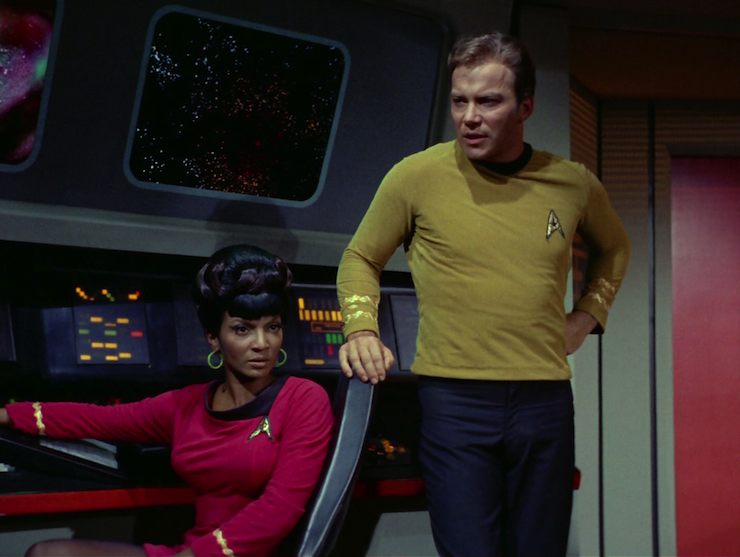
I cannot change the laws of physics! Scotty plays very little of a role here, barely seen, and only getting a few lines. Mostly he’s there to show up in sickbay all gray, as the first one to do so.
It’s a Russian invention. Chekov is very not happy with being poked, prodded, injected, inspected, neglected, and selected while they try to determine why he wasn’t affected by the radiation.
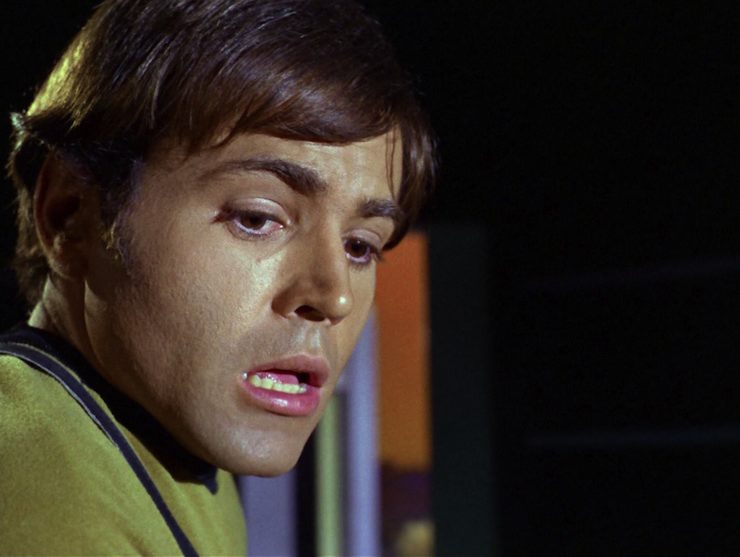
Go put on a red shirt. The one non-regular in the landing party—Galway—is the only one who doesn’t survive. Big shock. She gets a very effective scene when she passes a mirror and complains that it’s a stupid place to put one, but once she dies, she’s utterly forgotten and unmourned.
No sex, please, we’re Starfleet. Wallace is yet another woman from Kirk’s past, and yet another candidate for the “blonde lab tech” whom Kirk almost married, as mentioned in “Where No Man Has Gone Before.”
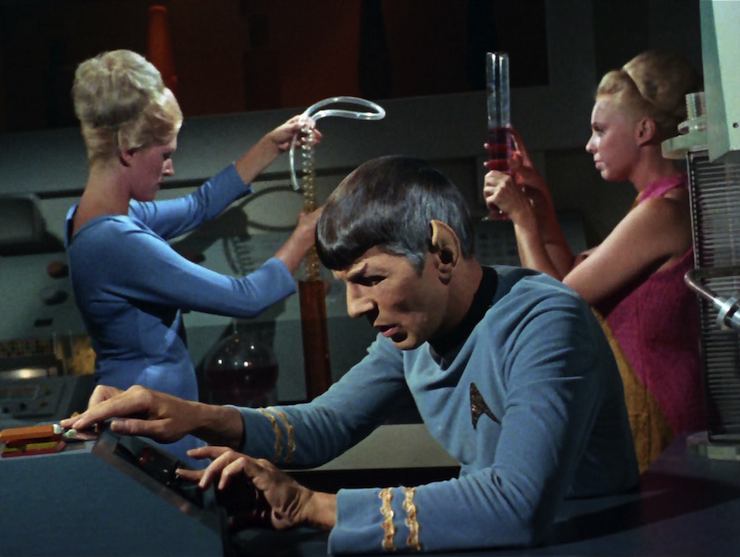
Channel open. “Now this isn’t going to hurt a bit.”
“That’s what you said the last time.”
“Did it hurt?”
“Yes!”
McCoy trying to reassure Chekov and Chekov having none of it.
Welcome aboard. Charles Drake nicely plays the bumfuzzled Stocker while Sarah Marshall is radiant as Wallace, despite her costume literally being made from drapes. Felix Locher and Laura Wood play the Johnsons, Carolyn Nelson is the latest member of the Post-Rand Yeoman Derby as Atkins, and Beverly Washburn plays the ill-fated Galway. Plus we’ve got recurring regulars George Takei, James Doohan, Walter Koenig, Nichelle Nichols, and Majel Barrett.
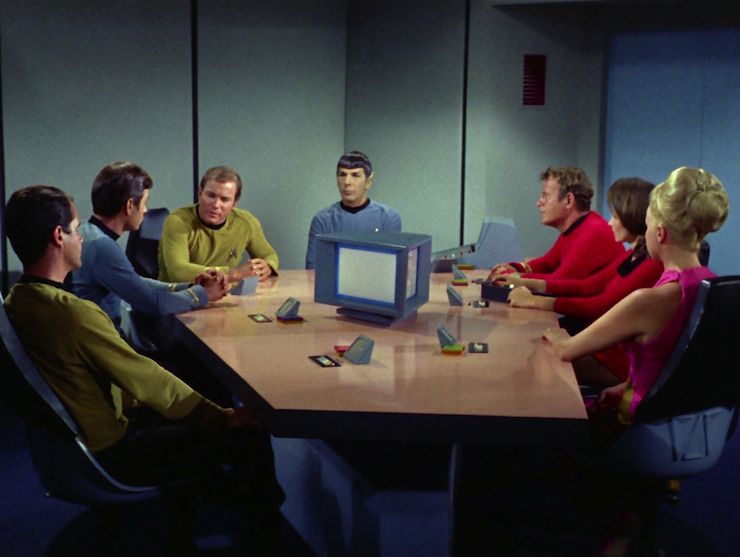
Trivial matters: In addition to the adaptation by James Blish in Star Trek 7, this episode was adapted into a Fotonovel.
This episode establishes Kirk’s age as 34, which means he was in his early 30s (or younger) when he took command of the Enterprise. A lot of background material on Kirk says that he was the youngest person to achieve a captaincy, though this was never stated onscreen at any point.
This is the first mention of the Romulans since their initial appearance in “Balance of Terror.” Footage from that episode is used for the Neutral Zone battle at the episode’s climax.
Kirk uses the same “corbomite” bluff used in “The Corbomite Maneuver” to trick the Romulans in this episode.
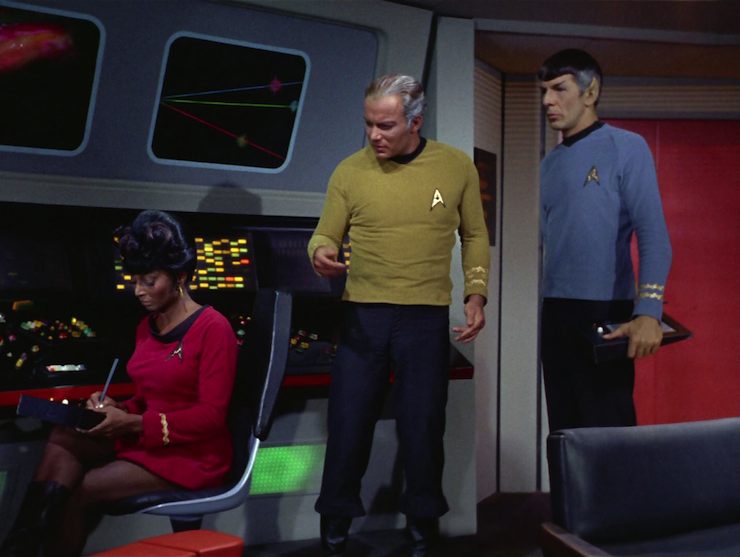
The costume department made larger uniforms for the aging personnel to create the illusion that they were shrinking with age.
The makeup used on McCoy here is very similar to what was used to age DeForest Kelley for his appearance as the 137-year-old McCoy in TNG‘s “Encounter at Farpoint.”
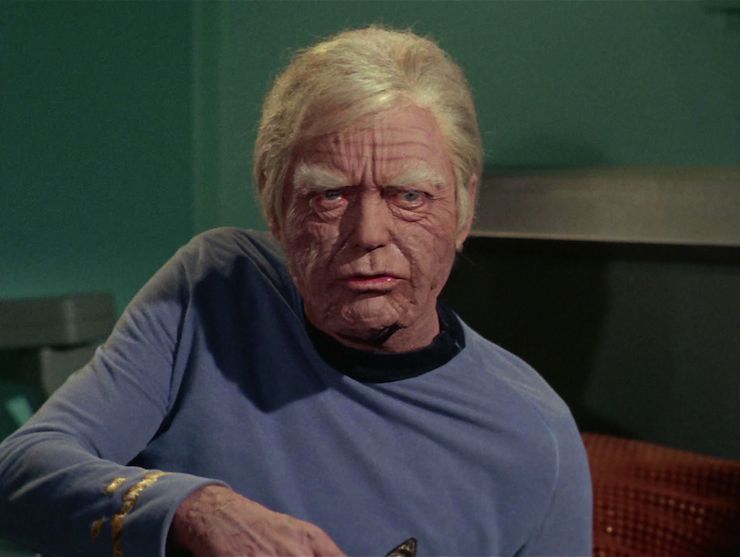
This is the first of three scripts by David P. Harmon. He’ll return to write “A Piece of the Action” later this season and “The Eye of the Beholder” for the animated series.
Early drafts of The Wrath of Khan had Wallace as the female scientist from Kirk’s past, but it was soon changed to the new character of Carol Marcus. As a nod to this, in Star Trek Into Darkness, Carol Marcus’s alias when signing onto the Enterprise is “Carol Wallace.”
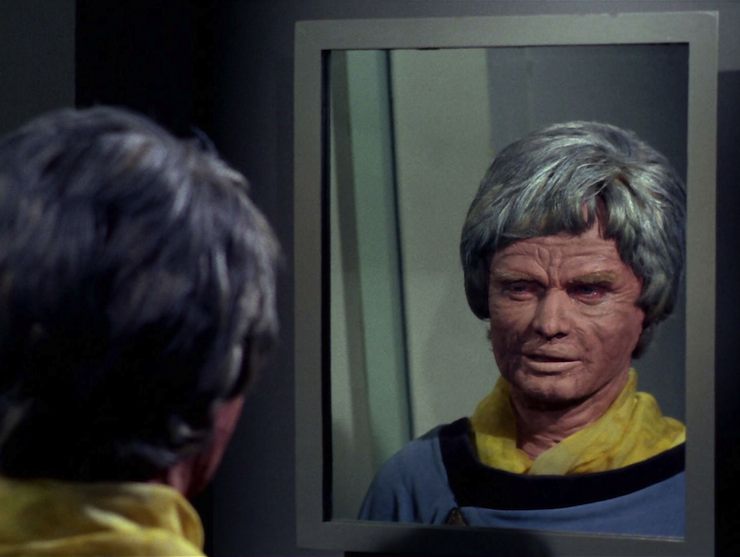
To boldly go. “I’ll live—but I won’t enjoy it!” The rapid-aging story is a cliché for a reason, and it’s almost always done stupidly. Wrinkled skin and gray hair are a result of time passing specifically, not an inevitable result of aging, and it’s something that can’t happen instantly—or if it does, it’d be the hair at the roots that’s gray. I especially love that Kirk goes from a receding hairline that’s graying to a full head of hair when it’s all white.
But what sells this particular version of the cliché is the acting. James Doohan doesn’t get to do much, but everyone else is in very good form. DeForest Kelley was born to play a crotchety old man. Leonard Nimoy does magnificently with the slower burn of Spock’s deterioration, weaving increasing exhaustion into his voice. Beverly Washburn does excellent work with Galway’s breakdown in sickbay (the fact that the crew barely even responds to her death is galling, albeit depressingly typical). And William Shatner does magnificent work, as he’s unable to accept his rapidly deteriorating faculties and what it means for the command structure of the ship. It’s a heartbreaking performance.
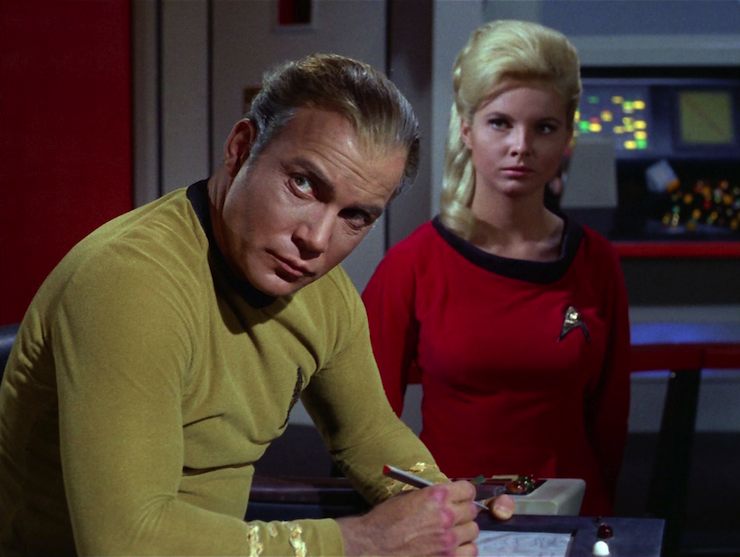
But it’s not just the faux old folks who do well here. George Takei and Nichelle Nichols do fine work trying very hard not to question their captain’s orders when he gives them multiple times, and they also waste no time in snarking off Stocker when he makes an ass of himself on the bridge. Walter Koenig gives a delightful performance as the put-upon Chekov, especially his epic rant after going through endless medical tests. (He also gets to scream upon seeing the corpse, which is always fun, as Koenig has the best scream this side of Fay Wray.)
What impressed me most on rewatching this episode, though, was Charles Drake’s performance as Stocker. It’s easy to consign Stocker to the same clichéd dustbin as all the other high-ranking dunderheads who get in our heroes’ way, but Stocker deserves more credit than that, because Drake shows that he obviously hates having to do what he’s doing, and is going through the same agony as everyone else watching Kirk stubbornly insist that he’s fit for command when he’s so totally not. Stocker’s only mistake is taking command when there’s a perfectly acceptable junior officer who already took command of the ship during a war right there on the bridge. (Grumble mutter.)
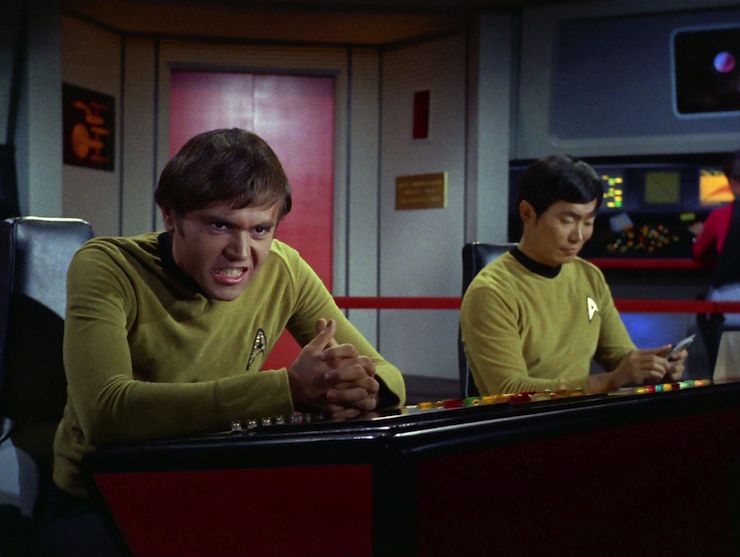
What impressed me less on rewatching this episode was the utterly superfluous character of Janet Wallace. She adds nothing to the story except for a flaccid romance hook that feels utterly repetitive. In fact, it’s literally repetitive: Wallace’s answer to Kirk’s query as to how long it had been since they saw each other was exactly the same as the one Areel Shaw gave in “Court Martial.” In fact, Wallace pretty much is Shaw: woman from the captain’s past who has a vocation that matches the needs of the episode’s plot. The difference is that Shaw was crucial to “Court Martial” while Wallace is irrelevant to “The Deadly Years,” as McCoy and Chapel would’ve been just fine. Hell, the script doesn’t bother to explain why she’s even on the ship, and her scenes with Kirk just don’t have any of the sparkle or interest that any of the (many) other scenes Kirk has had with women from his past on the show. (Hell, even the quick exchange between Kirk and Piper in “The Menagerie” had more sizzle, and that wasn’t even about Piper!)
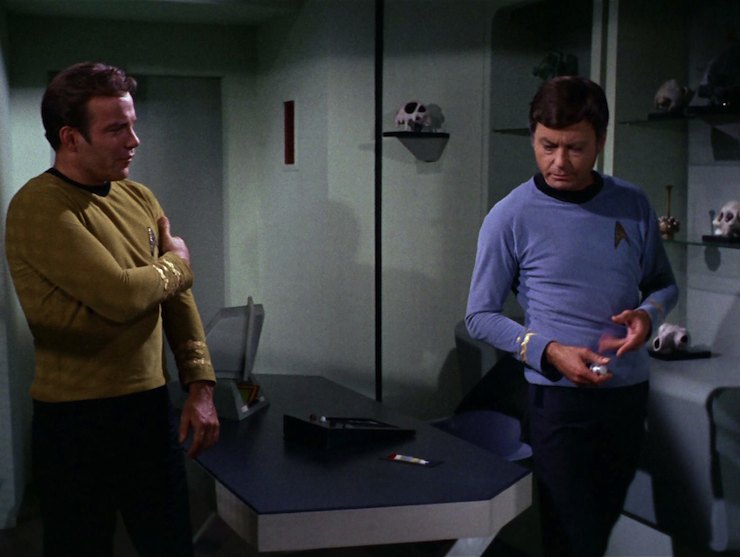
Still, this is a well-done episode that examines the ravages of aging impressively. Watching everyone wince and stammer as Kirk deteriorates right in front of them is very powerful, reminding me of when my grandmother started suffering from dementia a decade ago.
Warp factor rating: 7
Next week: “I, Mudd”
Keith R.A. DeCandido‘s latest book is Thor: Dueling with Giants, the first of the Marvel’s Tales of Asgard trilogy, available as an eBook (from Amazon, Barnes & Noble, or Kobo, among others). The print book will be out in March. Other 2016 work planned includes the next two Asgard books, Sif: Even Dragons Have Their Endings and The Warriors Three: Godhood’s End, as well as Stargate SG-1: Kali’s Wrath, stories in Alternate Sherlocks and V-Wars: Night Terrors, and bunches more.










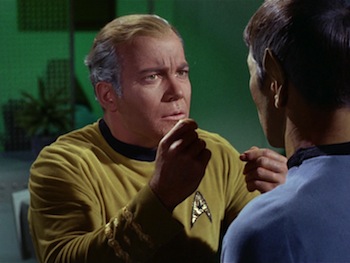
Keith, “A Piece of the Action” is not in the third season.
JanaJansen: DERP! Sorry about that. It’s fixed……
—Keith R.A. DeCandido
@krad – “reminding me of when my grandmother started suffering from dementia a decade ago.” <- this so true. Parts of this were really hard to rewatch as they reminded me of my last years with my grandfather in the early 2000s. I could imagine in painful detail what the crew was going through watching this.
I was really curious how you would rate this episode, because I could never decide whether I like it or not.
On the one hand, it’s really well done – the performances, the emotions, the pacing.
On the other hand, it revisits so many first-season tropes – a former girlfriend of Kirk’s (we had that for that three episodes in a row and then never again), an incompetent superior, a sickness where the cure can “cure or kill”, and where the symptoms go away immediately after being given the cure, even a shirtless Kirk scene.
And it makes little sense that Kirk becomes forgetful and falls asleep on the bridge when he’s only between 60 and 72 years old. He even starts forgetting things before he starts to look older. I know, they say that “his mental capacity is degenerating more rapidly”, but they never explain why. Also, nothing comparable happens to McCoy or Scotty. OK, it’s a nice change that Kirk is for once the most susceptible person instead of the most resilient.
I don’t feel as apologetic towards Stocker, because it seems to me that crossing the Neutral Zone is a major blunder. What does he think a neutral zone is for?
I agree that Wallace is superfluous, but I liked the exchange between her and Kirk after he has started aging – he seems to imply that she may be interested in him now because she likes older men, so she’s actually attracted by his misfortune, and he doesn’t want that.
It’s nice that we get not only one, but two female guest stars, both of them scientists (if Galway’s uniform colour is any indication). OK, so one of them is there to die and the other one to be someone’s love interest, but it’s still nice.
Oh, and I don’t think Wallace could be the “blonde lab technician”, because they split up six years ago, and Mitchell talks about their time at the academy there. Unless they were together for a really long time.
I’m not crazy about this episode. It’s so full of problems. Keith mentioned the medical problem with the depiction of rapidly forming wrinkles and instant gray hair — what’s even worse is how they’re instantly reversed at the end just by a shot of adrenaline, instead of needing weeks of recovery to regain lost muscle mass and restore damaged tissues and grow out new dark hair. That was just so dumb.
It’s also really, really insulting to old people. I know longevity and geriatric health were less advanced back then, but still, look how vigorous William Shatner is at 84 and it’s ridiculous to see McCoy describing this frail, doddering version of Kirk as being the equivalent of a man in his 60s. Not to mention the assumption that memory loss and dementia were a routine part of aging rather than a specific condition like Alzheimer’s. It’s somewhat excusable given that it’s not really aging but a form of radiation sickness, so it mimics unhealthy aging, but still, the assumptions really date the episode.
Plus, of course, today we can compare the conjectural aging of the actors with how they really aged, and it’s a pretty poor match. Spock is the only one who even comes close, because his age makeup and vocal change were kept subtle. It’s ironic that Shatner went for the cliched high and reedy old-guy voice when in reality his voice has grown deeper with age. (And it’s amusing that Shatner wouldn’t even take off his toupee as part of the age makeup, just had the makeup artists brush it back and whiten it. Now, that’s real commitment to vanity.)
Another big problem here: It’s never addressed what ten Romulan ships were doing inside the Neutral Zone. By definition, that’s supposed to be a place where neither power is allowed to have a military presence. But since the Romulan ships attacked the Enterprise within moments of its entry into the NZ, that means the Romulans were already there. They weren’t responding to its provocation — they violated the Zone first, and in massive numbers. What were they doing there?
This episode has another problem. It’s horrendously paced, making it a slog to get through on repeated viewings. This may have been a conscious editing decision, given the way it depicts Kirk and company losing their capacity, plus repeating orders to his subordinates, therefore you have scenes that stretch forever and ever.
I agree that it’s really insulting to old people. My father’s aunt lived till she was 96. Almost never got ill. Had full mental faculties up till the very end. Also, my grandmother turned 83 today. She works out regularly, is a fellow Game of Thrones fan like myself, and knits all kinds of patterns and designs.
I’ll grant that Shatner and the others put in decent performances, but the plot never really sustains this one. Christopher makes a really good point. What were the Romulans doing there? In a rush to create tension in the final act, Harmon and the writers didn’t think this plot thread through.
While I appreciate Stocker’s surprisingly multilayered role in the episode, this would have worked far better had Spock been the one to relieve his captain.
It always seemed weird to me too that they chose this age frame – 60 to 70, it’s not even really old. But I guess we can waive as consequences of this radiation messing up every process in the body…
I remember this episode for two things mostly, for good acting all around, but also for being one of the most disturbing. I guess it just hit too close to home both because of personal experience with older family members and my own fears associated with getting old. So I never even rewatched it but still remember most of it
Oh, and corbomite was a good bit of continuity.
Don’t forget when this episode was made. 60 to 70 was old for then. More people smoked and drank, if Mad Men is to believed, healthcare wasn’t as good, and they didn’t live quite as long as they do today. The ‘active senior’ is a fairly recent trend.
@8/Spot: Sure, but that’s just why it dates the episode so badly. The people who wrote this episode didn’t realize that such rapid deterioration was not a natural or inevitable part of the aging process. So the episode feels very naive and ignorant in retrospect. It’s the same kind of wince-inducing assumption as “The female of the species naturally experiences more terror” or whatever from “Wolf in the Fold.”
@9
December 8, 1967. I think that says it all about things being dated, hehe.
@8/Spot: I don’t think you’re right. Here are some politicians from that period as counterexamples:
Winston Churchill, born 1874, was British Prime Minister until 1955, when we was eighty years old.
Konrad Adenauer, born 1876, was German Chancellor until 1963, when he was eighty-seven.
Charles de Gaulle, born 1890, was French President until 1969, when he was seventy-eight.
My own grandfather lived to be eighty and was completely healthy up to about one year before he died in the 1970s. He did daily hikes where he walked too fast for us kids and never got any kind of dementia.
So, even if people didn’t live as long on average as they do today, there were already a lot of active seniors around.
I’ve read the complaints that the characters look too old for the ages that they’re supposed to be. Now, I may very well be wrong on this, but it seems to me that back in those days adults were just “older.” A lot of people in those days looked several years older than people of equal age today. People probably didn’t live as long, so they aged faster. Remember that the Social Security retirement age was set at 65 years in the 1930s because people weren’t generally expected to live much longer than that. I’m not certain about all this, it’s just my opinion.
@11
We can give examples and counterexamples all day. I’m going by average lifespan, which was 67 for American men at that time and 74 for women, and how the culture viewed seniors then, which was often the old man or woman with a cane. They’re weren’t many seniors jogging across TV show sets at the time. I can’t remember if Uncle Joe ever took a pilates class, but I didn’t see every episode of Petticoat Junction, haha.
I like the acting is this episode, but the Stocker thing always p*sses me off. Roddenberry was ex-military and he had to have known how the chain of command works. A visiting officer not on orders simply has no regulatory authority to take over, no matter what his rank is. And officers who make Commodore have been in long enough to know the regs and the chain of command.
@13/Spot: Yes, that’s exactly the point — that the culture viewed seniors through the filter of an unflattering and inaccurate stereotype. Even though there were plenty of older people who were vigorous and capable, the prejudice of the culture was that old people were useless and feeble. It’s no different from ’60s TV’s rampant condescension toward women or constant racist caricaturing of Asians, Arabs, or Native Americans. Just because it was a pervasive belief at the time, that doesn’t mean we’re not allowed to acknowledge that it was unfair and wrong. Heck, Keith slams TOS for its sexism all the time in these rewatches; why shouldn’t we call out this episode’s blatant ageism as well?
A lot of background material on Kirk says that he was the youngest person to achieve a captaincy, though this was never stated onscreen at any point.
True. It’s not even stated in the JJ films, although surely it must be true in Alt-Kirk’s case, as well.
If memory serves, Trek’s first onscreen reference to anyone‘s remarkable rise through the ranks was Tryla Scott, in season one’s “Conspiracy” – “It’s said you made Captain faster than anyone in Starfleet history.” (So even there, I guess, its hearsay.)
Do you know how and where this “everyone knows” thing about Kirk being the youngest got started? Was it in the TMP novelization, maybe?
Good review on all points, Keith.
@16/MikePoteet: The Making of Star Trek in 1968 said in Kirk’s “official biography” that Kirk “was the youngest Academy graduate ever to have been assigned as a Starship Command Captain.” Although the use of “Starship” at the time seemed to be meant to refer specifically to a capital ship like the Enterprise. It also said that before then, he had “received his first command (the equivalent of a destroyer-class spaceship) while still quite young.” That phrasing suggests he wasn’t the youngest commander of that class of ship. Which would mean, probably, that he commanded it at a rank below captain, because you don’t have to be a captain by rank to be the commanding officer (called “captain” by tradition) of a smaller class of ship.
Ragnarredbeard: Remember, Starfleet is not the 20th-century U.S. military. Not every structure is going to be the same, and we already saw where a ranking officer — remember, Stocker outranks everyone on the Enterprise — takes over when the captain’s unavailable in “The Doomsday Machine,” and Spock specifically said that was Decker’s right under regulations.
MikePoteet: I believe the notion of Kirk being the youngest captain in Starfleet came from the original materials that Roddenberry put together, and was printed in The World Making of Star Trek.
Christopher and others: I’m a bit more forgiving of what happens because McCoy very specifically states during the hearing that it’s radiation poisoning that mimics aspects of aging, not that it’s actually aging. Though your points about the stereotypes of aging are well taken….
—Keith R.A. DeCandido
@18/krad: Yeah, that’s my take too, as I said — that it hits so hard because it’s a disease rather than normal aging. The problem is that the characters talk as though it’s normal for people in their sixties or seventies to be in such terrible physical and mental condition.
And I think you meant The Making of Star Trek, not World (which was published 5 years later).
^ Gah! Yes, I meant Making. *gets more coffee*
—Keith R.A. DeCandido
@15
You have every right to acknowledge it. Frankly it’s not that important to me. I just can’t get too worked up about a TV show from 50 years ago. Though I suppose it would make for interesting study for modern kids, to see how times have changed.
“DeForest Kelley was born to play a crotchety old man” is my #newbandname. And yes, Stocker crossing the Neutral Zone is stupid, I don’t care if he’s been a bureaucrat all his career.
@6 – Eduardo: I’d love to know what your grandmother thinks of the Queen of Thorns. :)
@21/Spot: Acknowledging this issue is not getting “worked up.” It’s merely choosing to discuss a change in cultural perceptions and understandings between different generations.
@22: She enjoys the character, her attitude, her wit, especially her sarcasm, her sense of humor, and also the way she reacts to the other characters’ idiosyncrasies. Definitely on her plus list.
Cool, I thought she’d like her. I love the Queen.
@@@@@ 18 krad,
Starfleet is sure military when they want to be. They were strictly chain of command on more than one occasion and their use of ranks and positions such as first officer clearly speaks to naval traditions. Decker may have been a different situation, given his assignment as a line officer in command of a starship, although his obvious lack of fitness to command given the disaster (of his own making) to his crew would have been easily defensible by someone of Spock’s intelligence and record. Stocker was neither a line officer nor a starship commander; no military I know of would allow that person to command so much as a dinghy. JAGs, for instance, no matter what rank they hold, will never command any line unit.
Ragnarredbeard: I never said Starfleet wasn’t military. In fact, I’ve been a very loud opponent to the “Starfleet is not a military organization” horseshit that TNG especially propagated, as later in life, Gene Roddenberry forgot the difference between the words “military” and “militaristic.” I’m saying that specific protocols and regulations are going to vary after centuries. As an example, as little as 100 years ago, people in the U.S. military were given commissions and commands solely on what family they were born into.
—Keith R.A. DeCandido
The thing that gets me the most, as other people have mentioned, is how the Romulans seem to have been just “hanging out” in the Neutral Zone en masse. This isn’t the only time that happened; I can’t think of any specific instances offhand, but there were several times in TNG where the Enterprise entered the Neutral Zone and had Romulans all over them like a cheep suit within seconds. That always seemed like something someone should have said “Hey, wait just a damned minute…” about at some point in time. I know it had to be that way to make the plots work, but still…no entry means no entry.
@27/krad: Also, Starfleet isn’t just the 23rd century US military either – it has members from all over the world and some other worlds, too. It should be a mix of different military traditions.
@28/DonRudolphII: I often think that some writers mistake the Romulan Neutral Zone for Romulan territory itself — which is a pretty massive failure to parse the word “neutral.” (“What makes a man turn neutral? Lust for gold? Power? Or were you just born with a heart full of neutrality?”)
To be fair, the Neutral Zone concept was never properly fleshed out in any of the shows or films. Case in point, the Kobayashi Maru test. The minute Saavik plots a course to rescue the derelict freighter, they’re intercepted by Klingon cruisers who were clearly already there. Whoever programmed the simulation definitely expected the Neutral Zone to be populated by agressor warships. If it were more of a realistic scenario, there should have been a time delay for the Klingons and/or Romulans to properly respond to the Enterprise’s territorial transgression, which would have included extended time for communication, diplomatic excuses and whatnot. And in the Kobayashi scenario, the Klingons didn’t even want to talk. They just jammed all of Uhura’s frequencies.
@31/Eduardo: “Whoever programmed the simulation definitely expected the Neutral Zone to be populated by agressor warships.”
But that’s just my point — that expectation is contradictory. The name “neutral zone” has a very clear and specific meaning: It is a zone that is claimed by no nation. Usually it is also a demilitarized zone. This is not some made-up sci-fi term, it comes from real-world precedent. So it doesn’t have to be fleshed out in the show — its meaning is already well-established.
Not to mention that the rules applying to the zone were quite clearly spelled out by Spock in “Balance of Terror”: “…this Neutral Zone, entry into which by either side would constitute an act of war.” There’s nothing vague about that. So if screenwriters expected a neutral zone to have enemy warships in it, that’s a humongous mistake both in real-world terms and in Trek terms.
Now, the Kobayashi Maru is a simulation. It’s not designed to be a realistic reflection of the current astropolitical situation, it’s designed to represent the worst conceivable scenario in which a starship has zero chance of survival. So we can give that a pass. But here, we have ten Romulan ships in the Neutral Zone, a violation that “Balance of Terror” clearly established as an act of war, and yet it’s treated as inconsequential.
Not to mention that the rules applying to the zone were quite clearly spelled out by Spock in “Balance of Terror”: “…this Neutral Zone, entry into which by either side would constitute an act of war.” There’s nothing vague about that. So if screenwriters expected a neutral zone to have enemy warships in it, that’s a humongous mistake both in real-world terms and in Trek terms.
@32: Alas, that’s the inherent and most crystal clear problem with original Trek in a nutshell: lack of followthrough. The writers really didn’t think long-term. They never expected the show to gain the status it eventually did, with people analyzing every bit of little detail which would never stand up to scrutiny. For them, it was a matter of wrapping each episode to a network’s satisfaction, loose ends and logic holes notwithstanding.
Had there a been a bigger writers’ room at the time, I’d like to think they would have addressed those problems better. But then again, it was the 1960’s. No network would finance a show with that big a group. In reality, all they had was Roddenberry, Coon, Fontana, Justman (all overworked) and an army of freelance writers who had yet to properly understand the rules of this universe.
We can sort of make the Neutral Zone thing work if we assume that there is some sort of RealPolitik at work where it is first person to offend is at fault. It might be against the spirit of such a thing, but if one party violates it then the other side has to assume bad will and counter. So in practice the neutral zone ceases to exist once a confirmed entry by either side is made. If they subsequently high tail it back out, then you have a diplomatic incident but nothing more and both sides pretend that neither transgressions happened. Obviously there is an advantage to powers with cloaking devices there, since they have more plausible deniability but at the time of writing cloaking devices were a big and new thing for the Romulans.
If you look back at Cold War era works then there are examples all over the place regarding both NATO and Soviet forces making minor transgressions that are ignored. I recommend a movie called The Bedford Incident which shows, spoilers, what happens when everyone else wants to ignore a transgression but the captain on the ship on the spot (the type of military commander we’d see later in Trek with Jellico) just will not let it go without response.
@33/Eduardo: Yeah, but… “neutral.” It’s not that hard a word to figure out. Familiarity with Star Trek precedent is unnecessary — all that’s needed to see the mistake is familiarity with grade-school vocabulary. It’s like the writers saw the phrase “Romulan Neutral Zone” and blurred it into a meaningless jumble of syllables, instead of noticing, “Oh, yeah, that word in the middle means neither side has a claim on it.”
@34/Random22: Okay, my reply to Eduardo’s comment is lost somewhere in the system for the moment, so I’ll have to reply separately instead of editing…
Even if you’re right about the realpolitik of the situation, the thing about “The Deadly Years” is that the Romulans didn’t just sneak one ship into the Zone or react to the Enterprise‘s entry. As I said, they attacked within seconds of the E’s entry into the Zone, meaning they were already there for some reason of their own, unrelated to Stocker’s decision. And there were roughly ten of them. We never saw more than five Starfleet capital ships together at any one time in TOS (in “The Ultimate Computer”), so a fleet of ten vessels is massive by TOS standards. This is more than just dipping their toe in to test Starfleet’s response. This is more like assembling an invasion force.
What would’ve fit your premise better is if maybe two or three Romulan border patrol vessels had responded to the Enterprise‘s incursion an hour or so after their entry. That would make sense in the context of the situation — the Romulans seeing an unprovoked incursion and sending the available nearby ships to respond. Having ten ships on hand to attack the E mere seconds after they crossed into the Zone is ridiculous overkill and makes no sense. The only reason to have so many Romulan ships amassed in one place, and to be already within the Neutral Zone, is if they were planning to invade the Federation. But obviously they weren’t, since it was never mentioned again. So it’s a bad writing choice.
It might never be mentioned again explicitly, but less than a year later we have The Enterprise Incident where Starfleet explicitly sets out to heist a cloaking device from the Romulans so they work out what they are dealing with better. So clearly someone at Starfleet HQ, whilst very carefully ignoring the specific incident because nobody wants a war, pays very close attention to the specifics of the incident because nobody wants a war they might lose. It isn’t the kind of direct serialization that is ruining fashionable in current tv, but there is a sense of ongoing narrative. Unseen is the Romulan high command’s freaking out over this Corbomite stuff (because nobody wants a war they might lose), which might be the reason that whatever nefarious nefariousness the Romulans were up to got shelved.
This was clearly one of those very fortunate screw ups that history has from time to time. And we gotta remember that this is only a year after the Romulans made contact again after decades, and used a pair of new superweapons to do so. It is an evolving situation, as is current military parlance for screw up piled upon screw up.
@37/Random22: Maybe you’re right — maybe they were on the verge of invading, and somehow the corbomite bluff scuttled their plans. But that’s way too big a deal to be handled so cursorily within the episode. It would’ve been a better writing decision to have fewer Romulan ships and delay their attack. It was sloppy to pile on so many ships and not intend it to be a big astropolitical deal.
@21/Spot –
I’ve said this before when other people have expressed similar opinions. These rewatches and the ensuing conversations are how we do Star Trek these days. We’re waiting for the new movie, and there’s apparently something TV-like coming, but meanwhile there’s no new Star Trek video material. (Print material is published all the time, however.)
But for the most part, this is it – this is how we keep Star Trek alive. Yes, it happens that we’re focusing on the one from 50 years ago right now. We’ve also focused on the ones from 20-25 years ago. Because that’s what we have. We’re Trekkies, we love this stuff, and this is Trek right now.
So you may not get too worked up, and that’s fine. But the Tor.com conversations are what we have right now. There’s also TrekBBS and other venues. We’re keeping Trek alive with our “being worked up,” and we enjoy it. :)
BTW, my favorite part from this episode was when the closed captions had Kirk talking about the use of a “cobramite device.” I imagine it being hooded and shooting its weapons via fang-like protrusions…
@40/MeredithP: I hear “Cobramite” and I imagine Cobra Commander being pestered by a little floating guy who dresses up like him and has magic powers…
@39 – MeredithP: You know what I do when I read opinions like Spot’s? I ignore them. :)
@41 – Chris: LOL!
@42/lordmagnusen – Yes, but ranting is fun sometimes. Especially when it’s one I’ve practiced so well!
Fair enough. :)
The thing abut the Kobayashi Maru is that it’s not Romulans in the Neutral Zone but Klingons. Kirk even says that the Klingons don’t take prisoners. Seeing as the treaty says that neither the Feds nor the Romulans can enter the zone, What’s to stop the Klingons from finding a way in there and causing trouble? We know it’s the Romulan Zone from the mention of Gamma Hydra, It would be like there being a neutral zone between Alaska and Siberia where Russian and American forces can’t go but there’s nothing stopping the Chinese.
Also, who’s to say that the shortcut across the neutral zone didn’t pass very close to the Romulan side and the Roms were simply nearby? Why justify Stoker’s intrusion by claiming that the Romulans must have been there first anyway? And what about The Enterprise Incident? Are the Roms to blame for that one too? Looks to me like the Federation has violated the zone at least three times as often as the Romulans have. Remember The Way to Eden?
@45/kkozoriz: “Also, who’s to say that the shortcut across the neutral zone didn’t pass very close to the Romulan side and the Roms were simply nearby?”
The episode itself makes that very clear. Between Sulu’s announcement that they’re entering the Neutral Zone and the first hit of a Romulan weapon on the ship, only twelve seconds elapse. I just timed it. If the Neutral Zone were so narrow that a starship could get from one edge to the other in only a few seconds, it would be useless. So clearly they’ve barely even crossed the Federation border of the zone when the attack happens. The Romulan ships would’ve had to be already cloaked and lying in wait just inside the zone, watching the Enterprise and ready to attack the second it crossed the boundary. So there’s no doubt that the Romulan ships — roughly ten of them — violated the Neutral Zone well before the Enterprise did. To get ten cloaked Birds-of-Prey to just inside the Federation border of the Zone would’ve probably required hours — not to mention the weeks of advance planning that would probably be required to assemble and mobilize a force of that size in the first place.
Time and distance are fluid in Star Trek. Ships move at the speed of plot/ Is it more likely that the Romulans were nearby and entered the zone upon detecting the Enterprise on course to violate it or that the Enterprise entered the zone at a random time and place and just happened upon a Romulan fleet that just happened to be in their path and, for some reason, were cloaked? Would the show really turn down the tension to have a scene where they crew are talking about how lucky they are that they’ve been in the zone for two days and haven’t sighted any Romulans?
Boy, people think that Kirk is lucky! Stocker foiled a Romulan invasion without even knowing about it. Of course, Kirk helped out at the end by allowing the Enterprise to get away. Funny how none of the bridge crew comment about a Romulan invasion fleet.
I’ll stick with my original idea that the time between the entry into the zone and the first shot being fired was simply much longer than was show.
@47/kkozoriz: That’s actually what I’m trying to say, but I guess I haven’t put it across well. My point is that they should’ve presented this element of the story differently, because the way they did present it carries some implications that had nothing to do with what the story intended.
But I don’t agree that it would’ve been hard to fix it — indeed, the simplicity of fixing it is part of why it annoys me so. For one thing, Sulu’s line “Entering Romulan Neutral Zone” at the beginning of the scene could’ve been changed to something like “Now nearing our closest approach to Romulan space.” Or the first couple of lines of the scene could’ve been edited into the preceding montage of Spock, McCoy and Wallace working on a cure, to convey a greater passage of time between zone entry and the attack. And Sulu’s line “Maximum of ten” could quite simply have been changed to “Maximum of four,” say, or just cut altogether, since we never saw more than one onscreen at the same time (since it was all stock footage from “Balance of Terror”). So it would’ve been extremely simple to avoid the unintended implications of the scene as presented. A couple of strokes of a red pen in the script phase or a couple of different editing choices in post would’ve fixed it. As it was, with the attack coming instantly and with ten ships there without explanation, it was just overkill at the expense of credibility, a sloppy storytelling choice. That’s my point.
I just don’t see the need to justify the Enterprise’s entry into the zone by saying that the Romulans had a big invasion force in there and Stocker’s course just happened to encounter it. Space is big. Very, very big. Much more likely that the Romulans were nearby, saw the Enterprise approaching the zone and moved to intercept when they entered the zone. Why make the Romulans into the bad guys and forgive Stocker’s mistake (hell, make him an accidental hero)? Stocker was in the wrong. Entry into the zone was considered an act of war according to BoT so, at the moment the Enterprise crossed into it, the Romulans were within their treaty rights to attack, seeing as they were now technically at war.
@49/kkozoriz: Stocker was in the wrong. The Romulans had the right to attack. Nobody disagrees with you.
The only thing people say is: The Romulans were there too fast. Realistically, the Neutral Zone can’t be so narrow. That’s bad writing. To justify it in-universe, we would have to (ridiculously) assume that the Romulans were already there and were planning an invasion. So, bad writing.
@49/kkozoriz: “I just don’t see the need to justify the Enterprise’s entry into the zone by saying that the Romulans had a big invasion force in there and Stocker’s course just happened to encounter it.”
That is not even close to what I’m trying to do. As I’ve already explained more than once, I’m saying that the writer and director made a mistake in how they portrayed the scene, because that portrayal introduced unintended implications. It was a mistake to have ten ships attack the Enterprise only 12 seconds after it crossed the border, because that is not consistent with the intended scenario. It should have happened later, and it should have been fewer ships. I have explained this.
But you’re the one that said that the Romulans were already there. As I’ve said, time is fluid. Ever time how long Scotty’s 30 second countdown lasts in The Doomsday Machine?
Why postulate that the Romulans were up to no good already when the Enterprise enters the zone of not to shift blame to them as well?
Enterprise illegally enters zone. Romulans respond. Unnecessary time between them eliminated. Saying the Romulans were there first sounds like “They did it too!”
In TOS, the Romulans breached the zone once, in Balance of Terror. The Enterprise breached it three times, The Deadly Years, The Enterprise Incident and The Way to Eden. Only the last was not a deliberate act by the Federation. In The Deadly Years it’s clear that the Romulans are responding to the Enterprise being there. In your version, Stocker would have to pretty much stumble right into the fleet. Space is big.
@52: “Why postulate that the Romulans were up to no good already when the Enterprise enters the zone of not to shift blame to them as well?”
I am not “postulating” that. I’m saying that the way the scene was written and edited accidentally implies that that must be the case, and that it therefore shouldn’t have been done that way. Why can’t you understand that? I’ve only explained it five or six times by now.
It may imply it to you but I’ve never seen it that way. To me, The Enterprise was in the wrong and the Romulans responded. As I’ve said a few times myself, time and distance are fluid in Star Trek. They needed the Romulans to reposed and din’t waste time setting up some reason why they responded so, what seemed to us, quickly.
I don’t have problem with it s as it was done. At least, not any more that pretty much any other episode.
The Federation broke the rules, Stocker almost started a war and nobody paid any sort of price for it. I don’t need a secret Roman invasion in order to make it work.
@54/kkozoriz: It’s always like that with every plot hole and every bit of sloppy writing – some people are bothered by it, others don’t mind.
“Nobody paid any sort of price for it”: We don’t know that. There may be political repercussions after the credits.
@55/JanaJansen
Nobody on the Enterprise gave the slightest indication that they were surprised by the appearance of the Romulans. As a matter of fact, they were expecting it.
SULU: Entering Romulan Neutral Zone, sir. All sensors on maximum.
STOCKER: Thank you, Mister Sulu. Lieutenant Uhura, let me know if we contact any Romulan.
Nobody says “What are they doing here?” or “It must be an invasion fleet”. They entered the zone and expected the Romulans to respond if they were detected. Kirk doesn’t even try to take Stocker into custody for doing something that could have led to war. There’s not a peep about it, not now and not in the future. As a matter of fact, the next time we see the Romulans, the Enterprise has violated the NZ again.
For all the talk about how crossing into the zone is such terrible thing, it happens all the time with no consequences.
@56/kkozoriz: For an answer to your first seven lines (up to “… expected the Romulans to respond if they were detected”), please consult my comment #50.
Concerning Kirk not taking Stocker into custody: That’s true. But then, Kirk tends to be quite forgiving, and Stocker may still get into serious trouble when his superiors read Kirk’s report. We don’t know that and can imagine it any way we like.
Concerning “The Enterprise Incident”: That’s true as well. That episode is really morally ambiguous. Let’s talk about it when we get there.
“Crossing into the zone […] happens all the time without consequences”: Well, the Romulans come and shoot at them. I’d call that “consequences”.
Not on the Federation side. We’re told how crossing the zone is such a big thing and yet we don’t see anyone getting called out on it. It’s made out to be this big thing and in the end it’s just “Whoopsie”. We didn’t see much of the Romulans in TOS/TAS but it got be ridiculous in TNG. “Lead to war”, etc etc and then people cross the zone like they’re crossing the street.
TPTB made it out to be this big thing and then totally ignored it to tell a story. It gets to the post that you have to wonder if any of the characters believe what they’re saying or if they’re just spouting the expected rhetoric to cover their butts.
Sorry for going on so long but this episode really strikes a chord with me, and not a good one. It’s basically saying “The ‘good’ guys can do what they want and if you oppose them for any reason, not matter how valid, you’re in the wrong and they’re entitled to take whatever action they desire against you.”
I know what you mean but I don’t think that’s what’s happening here.
I think what’s happening is that the writers want Stocker to do something really really stupid, and dangerous, and irresponsible, and terrible, so that Kirk can come and save the day. I think everybody agrees that the “good guys” are in the wrong here.
So Stocker is stupid, irresponsible and dangerous so he’s still going to be in command of a Starbase? I think the biggest problem is that the guest star has to be shown to be really, really stupid to make our guys look good. No need for a Romulan invasion force that nobody seems to care about one way to the other.
Yes. Bad writing. And it wasn’t a Romulan invasion force.
Incompetent superiors are one of the more annoying TOS tropes anyway. Makes you wonder why the Federation works as well as it seems to do.
@61/Jana: No, it wasn’t meant to be a Romulan invasion force, obviously. But the way they set it up — with ten ships already in the zone, ready to attack within seconds of the Enterprise crossing the border — is hard to explain any other way. I don’t know why it’s been so hard to get across that I’m not talking about what the writer and director actually intended, but what they unintentionally implied by overplaying the danger so much. I’ve already spelled out how a tiny bit of rewriting or editing would’ve fixed the issues in the scene. There was no dramatic need for there to be ten ships, or for them to attack immediately.
@62/Christopher: I got your point and I agree with it. My comment #50 was an attempt to repeat it in simple words. Well, mostly – I didn’t mention the ten ships.
@63/Jana: Yep, you get what I’m saying.
I took the ten ships as simply being nearby. A fleet of some sort and, as I said earlier, there’s no need for them to all be capital ships. One or two cruisers and the rest as gunboats would work quite well. As to them already being in the zone, as I’ve said numerous times, time is fluid. The point was to get Stocker in over his head. We didn’t need a scene or even a line saying that they’d been in the zone for hours or days. A ship can cross the zone in as little or as much time as the story requires.
The Doomsday Machine required a 30 second countdown to build tension, That’s why it took a minute and a half to actually work.
In The Search for Spock. the self destruct started a 60 second countdown. In that time, they had to get to the transporter, call the Klingons, beam off, beam the Klingons in, the Klingons had to walk to the bridge and then get there in enough time to have a little chat with their ship. By the time we get back to the countdown, there’s still 10 seconds remaining. And the Klingons walked through the corridors, cautiously checking as they went. 60 seconds? Really?
The Romulans have sensors as well as cooking devices. They could have picked up the Enterprise on course to enter the zone, cloaked and moved to intercept as soon as they entered the zone. It wasn’t a major part of the story other than being a reason why Sticker got into trouble and only Kirk could save the day. There’s any number of reason why it was done as it was. Most of them come down to “the time wasn’t important, the fact that it was a mistake was.”
Stocker could have started a war and Kirk basically laughed it off once he got back in his chair.
@65/kkozoriz:
Agreed, it would have been nice to have a scene where Kirk reprimands Stocker to make sure that he understands just how idiotic and dangerous that was. Not on the bridge, though. He should have talked to him in private.
He shouldn’t have reprimanded him. He should have had him arrested and put in the brig. Simple as that. We’ve seen Kirk take superior officers to task before for doing stupid things. Matt Decker for instance. But there’s nothing at all about it. Instead Kirk basically brags about his ship.
STOCKER: Captain, I just wanted to assure you that I did what I thought best to save you and the men.
KIRK: Noted. You should know, however, that there’s very little a Starbase can do that a starship can’t.
If entering the zone was treated like it was in balance of Terror, it would have been treated better. But the Romulans were just the maguffin that put the ship into danger. It could have just as easily been an ion storm or such. It’s no wonder that the Romulans don’t trust the Federation even in the TNG era
I wouldn’t arrest him. He meant well and probably learned his lesson. Besides, he’ll be in enough trouble if the Romulans issue a complaint, so what’s the use?
He meant well? He violated the neutral zone which we have already been told is considered an act of war. And for what? To take a short cut to his new job posting? That’s an acceptable reason for potentially starting a war? McCoy had his latest treatment all ready to go and it not only cured Kirk but got him back into fighting trim in the brief time that they were being attacked. So it’s not like things were desperate. If Stocker had check with the medical alb to see what was going on there he wouldn’t have been quite so cavalier about potentially staring a war that could cost millions, if not billions of lives.
But he meant well…
I meant that he didn’t do it on purpose.
Sorry, that was probably not clear enough. What I meant is that he didn’t try to start a war.
Oh, he didn’t mean to do something that we’re told is a likely consequence of violating the neutral zone. And he’s going to be the commander of a Starbase near the Romulans? Yeah, I can see that working out really, really badly.
“And if you have to violate the neutral zone, just make sure that you don’t really mean to. After all, if you’re just shortcutting through it, who could possibly object?”
I could see it if this was some junior officer, an ensign forced into command who makes a mistake and has to have his ass pulled out of the fire. Stocker is a commodore. He’s the ranking office for light years. He of all people should know better. And that’s why he should be up on charges and sleeping in the brig.
First, I mildly disagree with the suggestion that the best line in the episode was Uhura saying “I think we just made contact sir.” It had to be after McCoy said “I’m not a magician I’m just a country doctor” and Spock throwing some serious shade with “just as I always suspected”. (Nothing against country doctors, of course, except they’re probably not qualified to be chief physicians on a constitution class starship.)
Second, while I agree that the cliched depictions of the Aging members of the crew as doddering silly old people was a little hard to take, especially after McCoy exhorts Spock go develop some sort of cure, and he literally does the “old man spittle lick” thing.
And speaking of finding adrenaline as the cure, really? THAT was the first time they thought to recollect what Chekov did differently on the planet surface?
Some elegant scriptwriting here weaving the Corbomite gambit into the storyline, and using the broken code 2 not only to emphasize Kirk’s loss of memory, but also to allow him to save the day by intentionally using the broken code to trick the romulans.
Actually just watching the end of this episode as I type this. It is one I never liked, so I have not seen it as often as the rest of the series….I think even back in the 60s, I thought the makeup was phony and unconvincing. The strongest aspect is that William Shatner and DeForest Kelley do a very good job of “selling” the old age thing. They really brought their “A” game to a not-so-great episode. I would not remotely give this a “7” — maybe a “5” at best. It’s slow and draggy, and the whole aging thing is lame. The actual story is not very interesting or original — as stated clearly here, the romance is a retread and so is the “Corbomite” strategy.
When I first saw this, I was about 12 — good lord! — it’s true. And then in the 70s reruns, I was 20-something. It’s weird to see this now, when I am 61! Frankly, it is very insulting (as well as untrue) that someone age 60(ish) would be doddering and senile — hello! most US Presidents are about this age. Most CEOs of big corporations are over 60.
The appearance of Kirk and McCoy is more like 85 than 60 — a whole generation older than stated here. I suppose you can say that Kirk had early onset dementia, but really, it’s just a nasty bit of ageism.
BTW: while people live LONGER today….they don’t stay YOUNG longer. We simply use advanced medical care to keep old people alive longer — often in nursing homes. It’s not necessarily a good thing.
People used to die younger 50 years ago, but it was often due to smoking — and preventable stuff like heart attacks and cancer, which we treat more effectively today. It wasn’t because they AGED sooner. A 60 year old in 1967 would not look remarkably different than a 60 year old today…errr…say like me. LOL
Ageism isn’t any prettier than sexism, and this is one area where OS Trek sometimes did fall down, for all their general intent to present a equal society of the future.
Also: is this the only show that mentions Kirk’s true age? I did not remember that — it wouldn’t have meant much to me at 12 — LOL — to a preteen, 34 is pretty nearly as old as 60 anyways. But it means that in the first season, Kirk is maybe 32 or 33? I guess he seemed older than that to me — it does sound young to be captaining a big starship. Does anyone know comparable ages for US Navy captains? I’ll bet they average a decade older than that. I looked up both Shatner and Nimoy’s birthdates — interestingly, very close together — March 1931. So they were about 36 when they filmed this. (It also reminded me: when they did the “City On The Edge Of Forever” episode…the 1930s they were portraying, was something they experienced IN REAL LIFE, their actual childhoods.)
Time flies.
People do stay young for a longer time, 60 today is not 60 in the 60s. Both physically (thanks to medicine) and socially.
Interesting that Dr. Wallace has ‘daddy’ issues with the kind of men she’s attracted to, no?
@74 lolamontez –
http://articles.latimes.com/2000/aug/05/local/me-65116
Leon Grabowsky; Youngest Captain of a Destroyer in World War II
He was 27 when he became captain of a US Navy destroyer in WW2.
I just rewatched this on BBC America. I would think it would be almost impossible in the 23rd century for someone to rise to command-level rank without having undergone extensive psychological tests to ensure that they are best suited for a command position. That Stocker was able to do so, shows it can’t. Stocker knew Sulu would be a more competent commander, even if he was a more junior officer. But Stocker’s ego, like Decker’s in “The Doomsday Machine,” overrode his judgment. Sulu, Uhura, Chekov or even Nurse Chapel, would have been as, if not more effective than, Stocker in command. He was a dreary, nervous bureaucrat. Isn’t commodore an honorary title given to senior captains anyway? I might be more sympathetic to his situation if he was a staff captain who had served planetside his entire career, and given commodore as a brevet or courtesy title. But if he was supposed to have been Starfleet’s best, then heaven help them.
Commodore is the lowest level of the admiral ranks. Although no longer an official rank is the US navy, it’s still used as a honorary title on occasion. Other countries, Canada and the UK for example, still use it as the equivalent of the US Rear Admiral.
Theoretically, Stocker should have been a Staff officer as opposed to a Line officer. Then he wouldn’t have been able to take command. But, apparently Starfleet doesn’t make such a distinction so any admiral outranks any captain and can take command of the ship when they deem it necessary. This would lead to a ridiculous like Admiral McCoy in Encounter at Farpoint being able to take command of a starship even though he has no experience in doing so.
@79/kkozoriz: McCoy has spent so much time hanging out on the Enterprise bridge and taking part in landing parties, he’d probably make a much better commanding officer than Stocker.
But if McCoy takes command, who’s going to cure the Captain?
@81/LordVorless: Oh, I didn’t mean in this episode. I meant Admiral McCoy in later years.
82, now you’re making me wish DeForrest Kelley had worked with John De Lancie for Q vs. McCoy.
Maybe this falls into the pacing critique, but scrolling through the comments, I haven’t seen anyone comment on how long and drawn out the hearing into Kirk’s command abilities is. It takes up an entire act, so it kills the pace of the episode, and from an “in Universe” perspective it makes no sense to gather up the entire crew for a quasi judicial trial in the middle of a crisis when the ship is apparently on the edge of the Neutral Zone.
Are there any other Star Trek episodes (in any series) suggest that such a procedure is necessary in the midst of a mission? Kirk tells Spock to take over command for Decker in the Doomsday Machine and no one convenes a hearing — Spock just does it. I seem to remember a few times in TNG where someone deems a commanding officer dangerously unfit—never Picard of course, usually the deranged Admiral of the week—and the crew makes a quick decision as to who to follow and then it is sorted out presumably off screen through a review process. That is much more realistic than expecting everyone to stop everything to participate in a legal proceeding where the outcome (frankly, in this case) is already clear, rendering the ship a sitting duck while the hearing unfolds.
@84/Steve C.: But this time it’s the outsider who declares the beloved and trusted captain unfit, and the crew doesn’t want to follow him. The hearing is necessary to make everyone see that Stocker is right.
@85 Well that’s certainly true from an audience perspective. As I rewatched this episode for the first time in probably decades, it just hit me that this hearing made no sense at all. The crew already seemed to be convinced. Whoever commented that the writers in the second season had no idea that fans would be nitpicking their work 50+ years later is absolutely right, though. At the end of the day, they were just trying to earn a living and keep the show going week to week.
@86/Steve C.: I think it also makes sense from an in-story perspective. The crew already knew that Kirk was unfit, but they didn’t want to admit it. Kirk had their loyalty, Stocker didn’t. He couldn’t be sure that they would follow him. Hence the hearing.
A few thoughts on this episode:
I’m rewatching the whole series with my fiancee (who had never seen anything Star Trek-related before this). She was in tears over Kirk’s scene where he accused Spock of betraying him. I’ve heard the TOS acting referred to as over-the-top and there may be some merit to that assessment, but they really do sell it.
As for the “ageism” angle, I don’t think that’s entirely fair. The computer assessment of Captain Kirk’s physical age is “60-72”. (Hardly a precise figure.) Furthermore, it’s already established that the mental degeneration caused by the radiation happens more quickly than the physical effects. So Kirk’s mental “age” could have already been into the 80s or 90s. And we all age at different rates, as was even explained in the episode.
Finally, I was struck by just how much Kirk on the “hot seat” during the hearing looked astonishingly like President Trump. Kinda spooky, TBH.
@88/doLst: But you’ll find very few 60-year-olds today who are as decrepit as Kirk was here, and plenty of 72-year-olds who are much more hale and hearty. Heck, Shatner is 88 now and he’s still more robust than Kirk was here. (Playing Kirk in the movies helped him stay in shape.)
Regarding all this talk about time. I always assumed that when the Enterprise was travelling at warp velocities, time within the ship moved slower than outside the ship. So, ten seconds of shipboard time might be equal to one or two hours of space-normal time.
@90/Paladin Burke: According to the Alcubierre theory, a warp drive would not experience time dilation because the variables cancel out in such a way that time passes at the same rate both inside and outside the warp bubble. Also, the modern Trek shows have always pretty consistently treated the passage of time from the shipboard characters’ perspective as equivalent to the passage of time in the outside world. We’ve never seen two characters disagree on how much time had elapsed since a given event.
Not to mention if if 10 seconds shipboard equalled one hour (3600 seconds) to an external observer, then Voyager‘s 70-year journey home would’ve taken just over 70 days from the crew’s perspective, and it would have been a very short series.
@91/CLB: You make some good points. But, here’s the rub: if the Enterprise travels at Warp 6 (216c), it would take the ship approximately 7.3 days to travel from Earth to Alpha Centauri. That’s not too long a time to be cooped up before planet fall. Now, if the Enterprise travels from Earth to Gothos (a 900 light-year distance) at Warp 6, it would take the ship approximately 4.16 years to cover the distance. That’s a long time to be cooped up! Perhaps, the Enterprise is equipped with a time warping device that permits the crew to manipulate the flow of time for longer distance treks. This might also explain the goofiness of stardates. And, as to Voyager, maybe the time warping device stopped functioning on the ship.
@92/Paladin Burke: The supposedly “official” behind-the-scenes warp charts have never actually been canonically referenced, and indeed their listed velocities are usually far slower than the velocities suggested onscreen. So they don’t count as authoritative, and in fact are startlingly wrong.
However, keep in mind that the Enterprise in TOS hardly ever visited Earth. Its mission was on the frontier, beyond Federation borders. Despite episodes like “Tomorrow is Yesterday” and “Assignment: Earth,” it was meant to be quite far from Earth as a matter of course. It might well have taken years to get out that far in the first place (since the intent of TOS’s makers at the time was that Kirk had already been captain for several years when the show began).
This is, admittedly, one of my least favorite Star Trek episodes. I just found it to be extremely slow paced and boring. That’s not to say that I don’t think it’s a well done episode in terms of depicting the ravages of old age. I’ve had a grandparent die of dementia, so I know only too well what it’s like to go through that heartbreak.
A few things that bug me specifically about this episode: The recycled line from Court Martial and uttered again here by Wallace is wince inducing. I’ve heard of reusing stock footage, obviously, as Star Trek was replete with it as a necessity. But the concept of reusing “stock lines” is ridiculous.
The other thing I disliked and found kind of out of place is at the beginning of the episode when Chekov screams and runs away upon encountering the corpse. I know he’s young, but he’s not that young. An officer in a professional military, or a military-like organization, you would expect to act with a little more self control.
A few observations on aging. I’ve seen several comments that Kirk looks too old and his facilities have degenerated too far for a 60-72 age range.
First, of course, early-onset Alzheimers does exist. A parent of a friend of ours was diagnosed at 55. It can develop slowly or quickly.
Also, the appearance of age varies greatly. An anecdotal example: I worked retail. When I was 55 years old I was called up to the security office to be the second associate for an accused shop lifter security had taken into custody.
While we were waiting for the police, the security officer took his ID (yes, that is allowed in our state. He would have the right to refuse, of course.) His ID identified him as 50 years of age.
His face was heavily wrinkled, his muscle mass was obviously diminished, he was missing at least 2 teeth (which we could see when he spoke) and his hair was white.
I, on the other hand, had (and still do) have all my teeth, my muscle mass was still good (as my twenty something employees could testify after seeing me lift weights they couldn’t), my skin was smooth and my hair still dark (unfortunately at 63 no longer the case).
I was five years older than he was, but he looked at least 15 years older than I did.
Now, I have the advantage of good genes (given my known ancestry: maternal grandmother lived to 84, maternal grandfather to 91, and my paternal grandparents died at 98.5 and 99.5. My parents were still alive then so I couldn’t factor them in directly, but they have since passed, both at 94.)
So, didn’t have any issues with Kirk aging more quickly. Note that McCoy was older than Kirk to start and, while he was also losing his facilities, was in much better mental state than Kirk, though his apparent age would have been far higher. But Gallway appeared younger than Kirk at the beginning of the episode, but physically (though not apparently mentally) deteriorated much more quickly.
@95/costumer: Yes, of course different people age at different rates. The problem here is that when the computer was assessing Kirk’s condition, it said, “Subject’s physical age based on physiological profile, between 60 and 72.” In other words, it’s defining that as the average condition of people in that age range, not a rare outlier. It’s saying that any given person in that condition is most likely in his 60s or early 70s. That’s why it’s such a failure of futurism.
@96 – Kirk’s physiological profile is not an average and could take things such as early onset Alzheimer’s into account. It’s not just an average, it’s comparing Kirk’s condition, which is unique to him, to theirs. In other words, if you were looking at Kirk for the first time and not having any prior medical information, he’d fit within this range which MAY contain people with early onset conditions.
A clichéd plot but I found it serviceable enough. Not brilliant but it kept me occupied for the runtime. A goofy little romp enlivened by the mystery of why Chekov wasn’t affected like the rest.
This was a really great story but I’m not so forgiving of Commodore Stocker. I can understand his reason for wanting Kirk to be relieved of command–he wasn’t fit. Unfortunately, Stocker’s ineptitude in the command chair was pathetic. I don’t agree with some comments here that he should’ve been arrested after crossing the Neutral Zone but do think Starfleet Command should reevaluate his worthiness to command a starbase.
Janice Wallace. I love to see an intelligent, professional woman on TV. Sadly, it’s not her. The way her lines were delivered–they were lackluster. I can’t buy her as a doctor. I thought Denise Richards in The Worlds Is Not Enough was more credible.
Put me on the side of “this episode kind of stinks.” I’ve got two main problems, really: first, Kirk is oblivious to how his mental faculties are degrading and the potential consequences of that; what’s worse, the finale leaves you with the impression of “I was right all along.” Second, the whole subplot of him being relieved of command is just a big chunk of time taken out of the episode that adds nothing to it.
Instead of being shocked and concerned that he’s forgetting orders just after he gives them, Kirk dismisses it, and the danger to the ship. No one should be in a command position if they’re not sensitive to their own condition and aware of the possibility of losing the capacity to effectively command. For someone in Kirk’s position to blithely gloss over glaring lapses, and treat his own crew harshly when they react to it would be indicative of toxic leadership, and traits that would disqualify someone from being put in such a position of authority. And just as bad from a “lessons learned” perspective, the only thing that saves the day is a total deus ex machina moment. From start to finish, Kirk acts like he’s invincible and a better leader with half a brain than anyone, and is rewarded for it.
The whole command inquest subplot is mostly a rehash of things we’ve already seen with some regulations mumbo jumbo thrown in. And, as mentioned, instead of Sulu taking command – something that’s already precedent – it results in a clueless shoe clerk taking command and immediate placing the ship in danger. There are just so many better ways this could have played out. To the commodore’s credit, he’s not trying to take command; he suggests Spock take command first. But it’s hard to take him seriously when he jumps in and acts just as impulsively (and takes far more unnecessary risk) as senile Kirk.
I can agree that it’s kind of fun seeing Kirk and McCoy in particular aging, and reacting to that. It’s about the only redeeming thing about the episode. I think if the focus would have been more on them recognizing their own decline and working through it, this could have been a fairly enjoyable episode. Instead, it kind of lumbers into disaster, and is magically saved by Kirk’s return to form.
Ultimately, it’s an episode with too many “why are you being so stupid!” moments to be very enjoyable. TNG would rehash the aging thing (Unnatural Selection) and do a better job of it, even though that wasn’t a great episode. And then the technical aspects of it, like some kind of double secret radiation, and aging that turns already-grown hair grey, but can be reversed (including the hair) instantly. Oh, and they stumble on the adrenaline cure in a conversation that you’d think would have taken place as soon as they figured out that Chekov was the only one of the group not aging. It just feels like a story where someone wrote themselves into a corner, grabbed a solution (and not a novel one) out of a bag, and called it a day. I’ll go with Warp 3.
@100/UncreditedLT: “No one should be in a command position if they’re not sensitive to their own condition and aware of the possibility of losing the capacity to effectively command.”
I don’t feel that’s a fair criticism, since the whole idea is that Kirk’s dementia is compromising his judgment so that he can’t recognize how his judgment is compromised. I believe that’s not uncommon in cases of Alzheimer’s and the like, to deny and rationalize cognitive lapses rather than fully understand what’s happening. It’s not a character flaw, it’s a symptom of the disease.
Although you have a point about Kirk being right anyway. The same thing happened in “Obsession,” where Kirk had an irrational Ahab-like fixation driven by his guilt, but still turned out to be right all along.
Having four relatives who have gone through Alzheimers (or some other form of dementia; we did not have autopsies performed to find out) I can testify that the sufferer does not usually realize they are declining. They may have an occasional realization, but that is also soon forgotten and they continue, believing they are in full possession of their faculties.